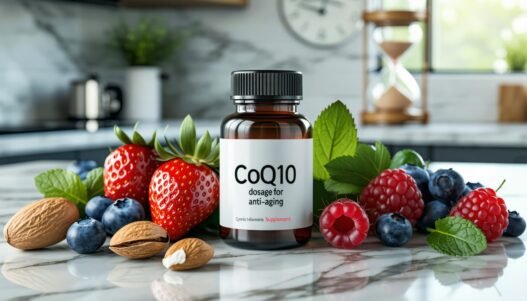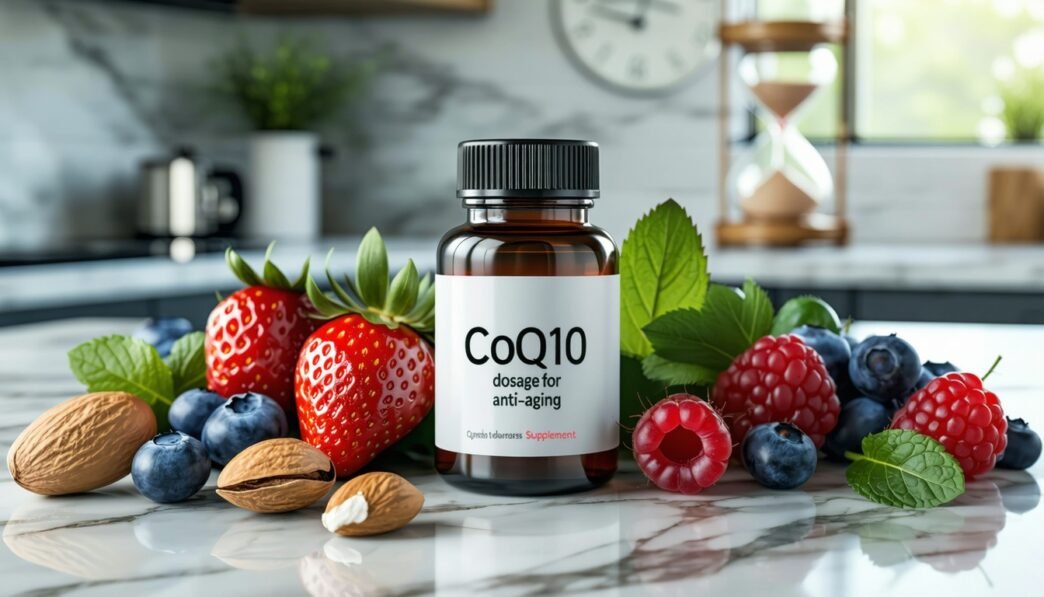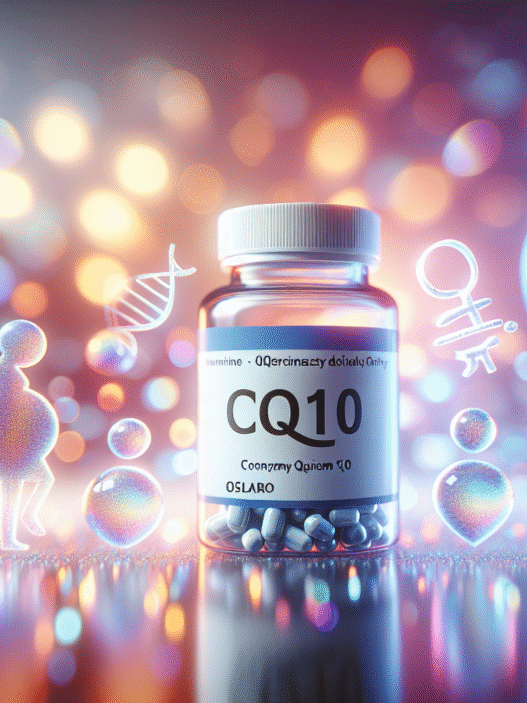CoQ10 and Skin Health
As we age, maintaining youthful and healthy skin becomes a significant concern. CoQ10, a naturally occurring antioxidant, plays a crucial role in reducing the signs of aging and promoting overall skin health. Here, we explore the benefits of CoQ10 for the skin and how to apply it effectively.
Benefits of CoQ10 for Skin
CoQ10 offers numerous advantages for enhancing skin vitality and combating the visible signs of aging. Key benefits include:
-
Reducing Oxidative Damage: CoQ10 helps protect the skin from harmful UV rays and environmental pollutants, reducing oxidative stress (Healthline).
-
Minimizing Wrinkles: Regular use of CoQ10 can decrease the depth of wrinkles, making the skin appear smoother and more youthful.
-
Promoting Antioxidant Protection: CoQ10’s antioxidant properties fight free radicals, which contribute to premature aging and skin damage.
-
Enhancing Skin Elasticity: CoQ10 aids in maintaining the skin’s elasticity, helping to firm and tighten the skin.
-
Improving Skin Repair: By supporting cellular health and regeneration, CoQ10 promotes the repair of damaged skin and encourages new cell growth.
For more detailed information on these benefits, visit our page on coq10 benefits for skin.
Applying CoQ10 for Skin Health
To maximize the benefits of CoQ10, it’s crucial to apply it appropriately. Here are some effective methods for incorporating CoQ10 into your skincare routine:
Topical Application: Using skincare products that contain CoQ10, such as serums and creams, is a direct way to deliver the antioxidant to your skin. For product recommendations, see our guide on coq10 skin care products.
Supplementation: Oral CoQ10 supplements can support overall skin health by improving cellular energy production and reducing inflammation. Learn about the best coq10 supplements for glowing skin.
Combining with Other Antioxidants: Enhance the effectiveness of CoQ10 by using it alongside other antioxidants like Vitamin C and E. This combination can provide a synergistic effect, boosting overall skin protection (coq10 antioxidant benefits).
Proper Dosage: Adhering to the right dosage is key to avoiding potential side effects while reaping the maximum benefits. For optimal results, follow the recommended coq10 dosage for anti-aging.
| Application Method | Benefits |
|---|---|
| Topical (Serums/Creams) | Direct skin absorption, targeted wrinkle reduction, improved elasticity |
| Oral Supplements | Enhanced cellular energy, reduced inflammation, overall skin health |
| Antioxidant Combination | Synergistic effect, increased protection against oxidative stress |
Incorporate CoQ10 into your daily skincare routine to combat the signs of aging effectively. For a comprehensive guide on achieving youthful skin with CoQ10, visit coq10 for youthful skin and coq10 for anti-aging skincare.
Understanding how to harness CoQ10’s benefits can significantly impact your skin’s appearance and health. By adopting these practices, individuals aged 35–65 can enjoy a more radiant, youthful complexion. For additional insights on CoQ10’s role in skin health, explore our article on coq10 and skin health.
CoQ10 and Male Fertility
Exploring the benefits of CoQ10 on male fertility reveals that this potent antioxidant plays essential roles in enhancing sperm activity and overall fertility.
Enhancing Sperm Activity with CoQ10
Supplementing with CoQ10 has been found to significantly improve sperm activity and concentration in males. Studies suggest that CoQ10 can mitigate oxidative damage, which is often a leading cause of reduced sperm quality and infertility (Healthline). By increasing antioxidant protection, CoQ10 helps maintain healthier and more motile sperm.
| Metric | Effect of CoQ10 Supplementation |
|---|---|
| Sperm Concentration | Increased |
| Sperm Motility | Enhanced |
| Sperm Morphology | Improved |
| Sperm Density | Elevated |
Role of CoQ10 in Male Fertility
In patients with male infertility, CoQ10 has shown promising results. Supplementation has enhanced semen parameters by improving concentration, density, motility, and morphology of sperm (PubMed Central). This improvement in sperm quality is crucial for couples facing fertility challenges.
CoQ10’s ability to boost mitochondrial function in sperm cells enhances their energy production and reduces oxidative stress. This creates a more favorable environment for sperm to thrive, thereby improving the chances of successful conception. For those seeking more information on the role of CoQ10 in maintaining vitality, our article on best CoQ10 supplements provides valuable insights.
The significance of CoQ10 extends beyond male fertility to other health aspects, such as heart health and skin care. Understanding its multi-faceted benefits can help individuals maximize their health and wellness efforts.
CoQ10 and Migraine Management
Coenzyme Q10 (CoQ10) has shown promise in managing migraines, a common and debilitating headache disorder. Understanding its effects and mechanisms on migraine episodes can help individuals make informed decisions about their health.
Effects of CoQ10 on Migraine Episodes
Research suggests that CoQ10 has the potential to reduce the severity, duration, and frequency of migraine episodes in adults. According to a review of six studies, CoQ10 supplementation can improve abnormal mitochondrial function, which is a known contributor to migraines (Healthline).
In a small 2019 study, participants treated with 400 mg of CoQ10 per day experienced significant reductions in the frequency, severity, and duration of migraine episodes compared to a placebo group. The study indicates that consistent CoQ10 supplementation could be a viable option for those suffering from chronic migraines.
Mitigating Migraine Symptoms with CoQ10
CoQ10’s efficacy in reducing migraine symptoms is largely attributed to its role in enhancing mitochondrial function and reducing oxidative stress.
In patients with mitochondrial myopathy and other related conditions, CoQ10 supplementation has been shown to improve mitochondrial function. These improvements might translate to reduced migraine symptoms, as migraines are linked to mitochondrial dysfunction.
Additional studies have highlighted the antioxidant properties of CoQ10, which can help mitigate oxidative stress, another factor implicated in migraines. By reducing oxidative stress, CoQ10 may alleviate some of the underlying causes of migraine headaches.
Considering CoQ10’s potential benefits, individuals suffering from migraines might find relief through supplementation. For more information on the optimal dosage for specific health conditions, check out our section on coq10 dosage for anti-aging.
Table: Effects of 400 mg CoQ10 on Migraine Symptoms
| Group | Frequency | Severity | Duration |
|---|---|---|---|
| CoQ10 Group | Reduced | Reduced | Reduced |
| Placebo Group | No Change | No Change | No Change |
(Source: Healthline)
By incorporating CoQ10 supplements into their regimen, individuals may not only address migraine symptoms but also enjoy other health benefits. For further reading on CoQ10 and its various applications, visit our articles on coq10 benefits for skin and best coq10 supplements.
CoQ10 and Brain Health
Impact on Memory and Cognitive Functions
CoQ10 (Coenzyme Q10) plays a significant role in maintaining brain health, especially in adults between ages 35 and 65 who are concerned with aging and vitality. As an essential component of the electron transport chain, CoQ10 contributes to ATP production in mitochondria, which is crucial for energy metabolism and cellular function.
One of the key benefits of CoQ10 is its antioxidant property. It helps in stabilizing plasma and intracellular membranes and protects membrane phospholipids from peroxidation. This reduction in oxidative stress can enhance overall cognitive functions such as memory and focus.
Recent studies suggest that CoQ10 might lower harmful compounds in the brain, potentially improving memory and cognitive features. However, more human studies are needed to firmly establish these benefits. Low levels of CoQ10 are associated with increased neurotoxicity due to the buildup of harmful proteins in the brain, which further underscores its importance for cognitive health (Healthline).
Role in Alzheimer’s and Parkinson’s
The role of CoQ10 in slowing the progression of neurodegenerative conditions like Alzheimer’s and Parkinson’s has been a subject of research. CoQ10’s ability to reduce neurotoxicity might prove beneficial in managing these conditions. For Alzheimer’s, the buildup of certain proteins in the brain leads to neurotoxicity, and CoQ10 supplementation could help in reducing these harmful compounds.
In the case of Parkinson’s disease, CoQ10 may play a role in protecting dopaminergic neurons from oxidative damage, which is a critical factor in the disease’s progression. However, more clinical trials are necessary to determine the efficacy and optimal CoQ10 dosage for anti-aging benefits specifically targeted at these neurological conditions.
| Condition | Potential Benefit of CoQ10 |
|---|---|
| Alzheimer’s | Reduction of harmful protein buildup, decrease in neurotoxicity |
| Parkinson’s | Protection of neurons, slowing disease progression |
Further information about CoQ10’s impact on various aspects of health is available in related sections like coq10 and mitochondrial function and coq10 antioxidant benefits.
Recommended Dosage for Brain Health
Though specific recommendations for CoQ10 dosages vary based on individual conditions and health goals, a general range for supporting cognitive function and potentially slowing neurodegenerative conditions is between 200-400 mg per day. Always consult a healthcare provider to determine an appropriate dosage based on personal health needs. For more information, visit best coq10 supplements and coq10 supplements for energy.
CoQ10 for Exercise Performance
CoQ10, or Coenzyme Q10, has garnered attention for its potential to enhance exercise performance. As the body ages, maintaining vitality and physical capability becomes increasingly significant, particularly for those between ages 35-65.
Enhancing Exercise Performance with CoQ10
Supplementing with CoQ10 can help improve exercise performance by decreasing cellular oxidative stress and enhancing mitochondrial function (Healthline). Essential for energy production, CoQ10 supports efficient muscle contraction and sustained exercise, which can reduce fatigue and improve overall performance.
The reduction in oxidative stress is crucial, as free radicals formed during exercise can lead to muscle fatigue and damage. By mitigating these effects, CoQ10 allows for more prolonged and effective workouts.
Mechanisms Behind Improved Performance
The benefits of CoQ10 aren’t limited to reducing fatigue. This substance plays a role in mitochondrial biogenesis, the process by which new mitochondria are formed in cells. Enhanced bioenergetics resulting from CoQ10 supplementation has been shown to alleviate symptoms of mitochondrial deficiency syndromes and aging.
| Mechanism | Effect on Performance |
|---|---|
| Decreases Oxidative Stress | Reduces fatigue and muscle damage |
| Enhances Mitochondrial Function | Improved energy production, supporting sustained exercise |
| Supports Muscle Contraction | More efficient workouts |
CoQ10 also influences cardiovascular health positively by reducing markers for cardiovascular disease and inflammation, contributing to better endurance and stamina during physical activities (NCBI).
When incorporating CoQ10 into a fitness routine, it’s important to adhere to recommended dosages to maximize benefits. For information on the optimal daily dosage, visit our section on Recommended Dosage of CoQ10.
By understanding how CoQ10 supports physical performance and overall vitality, individuals can make informed decisions on supplements that may enhance their exercise routines and combat the effects of aging. For more insights on CoQ10 and its diverse advantages, explore our articles on coq10 benefits for skin, coq10 and mitochondrial function, and coq10 and heart health.
Recommended Dosage of CoQ10
Optimal Daily Dosage
The optimal daily dosage of CoQ10 for general health and anti-aging primarily falls within the range of 100 to 200 milligrams (mg) per day. CoQ10 plays a crucial role in energy production and acts as a powerful antioxidant, which protects the body from oxidative stress and cellular damage. This dosage helps maintain adequate CoQ10 levels in the body, promoting skin health, improving energy levels, and possibly slowing the aging process.
| Purpose | Dosage (mg) |
|---|---|
| General Health & Anti-Aging | 100 – 200 |
| Taking Statins | 100 – 200 |
| Migraine Management | Up to 400 |
| Heart Disease | Up to 200 |
Figures courtesy of Healthline
Dosage for Specific Health Conditions
Statins Medication
For individuals taking statins, a class of drugs used to manage cholesterol levels, supplementing with CoQ10 can help alleviate muscle pain associated with these medications. The recommended daily dosage is between 100 to 200 mg.
Heart Disease
CoQ10 supplementation can benefit those with heart disease by reducing the risk of heart-related complications and easing symptoms such as angina. The suggested dosage for heart disease patients is up to 200 mg per day. For more in-depth information, see our article on CoQ10 and heart health.
Migraine Management
For managing migraines, studies have shown that a higher dosage may be more effective. A small 2019 study indicated that individuals taking 400 mg of CoQ10 daily experienced significant reductions in the frequency, severity, and duration of migraine episodes (Healthline). More details can be found in CoQ10 and migraine management.
Older Adults and Physical Activity
Older adults who have higher blood levels of CoQ10 tend to be more physically active and have reduced oxidative stress, which may help prevent heart disease and cognitive decline. Supplementing with CoQ10 at recommended dosages can improve muscle strength, vitality, and physical performance.
For those interested in learning more about the relationship between CoQ10 and maintaining vitality through aging, check out our articles on best coq10 supplements and coq10 and anti-aging properties.
By understanding the optimal dosages and how they relate to specific health conditions, individuals can maximize the anti-aging benefits of CoQ10, ensuring better health, revitalized skin, and enhanced overall well-being.





















